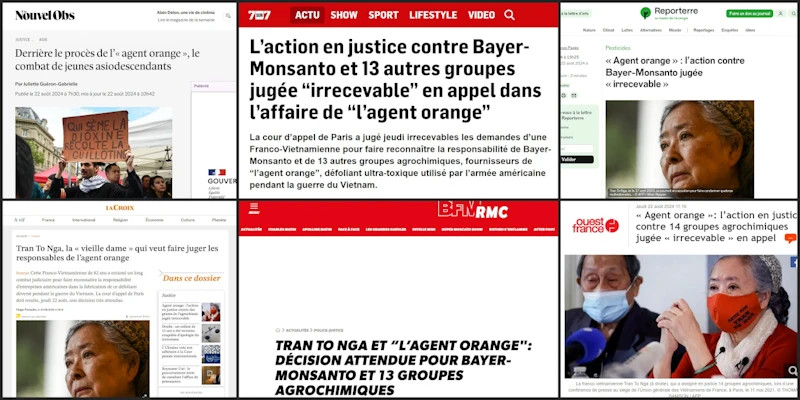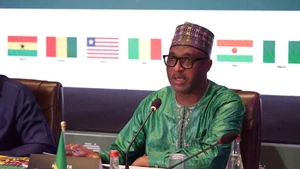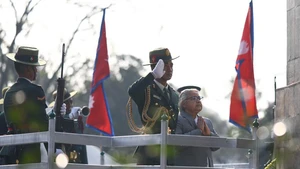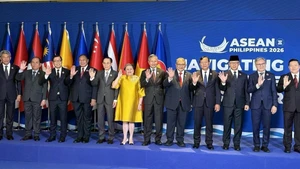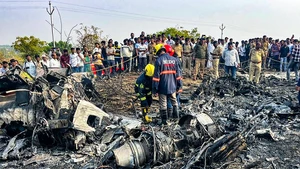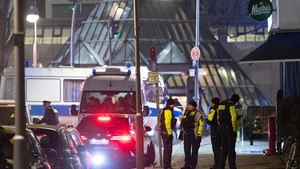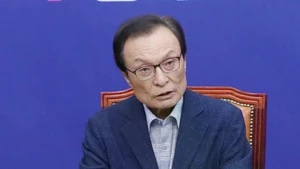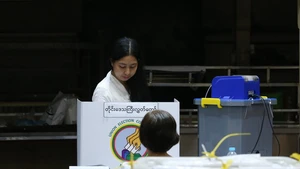The lawsuit sought to hold these companies accountable for supplying Agent Orange/dioxin to the US military during their war in Vietnam. The decision has sparked disappointment among the French public, who have expressed admiration for Tran To Nga’s relentless fight for justice and vowed to continue supporting her cause.
The Paris Court of Appeal's ruling echoed that of the Evry Court of First Instance in 2021, claiming it lacked jurisdiction over the chemical companies involved. The court justified its decision by citing the companies’ “judicial immunity”, arguing that they acted under the orders of the US government.
Bertrand Repolt and William Bourdon, Tran To Nga's legal representatives, expressed deep disappointment, although they had anticipated the outcome. The lawyers criticised the court for misapplying the principle of judicial immunity (for chemical corporations) and issuing an outdated ruling that contradicted the legal arguments and the modern application of the law. Tran To Nga and her legal team intend to appeal to a higher court.
Over the years, Tran To Nga’s lawsuit has garnered significant attention from the French public and the media. Several influential figures in France have voiced their disappointment with the Paris Court of Appeal’s decision, in favour of the multinational chemical corporations.
On her social media X account, Nadege Abomangoli, Vice President of the French National Assembly, highlighted that chemical companies like Monsanto and Hercules have remained unpunished despite decades of struggle for justice. She argued that effective decolonisation requires appropriate compensation and reparation.
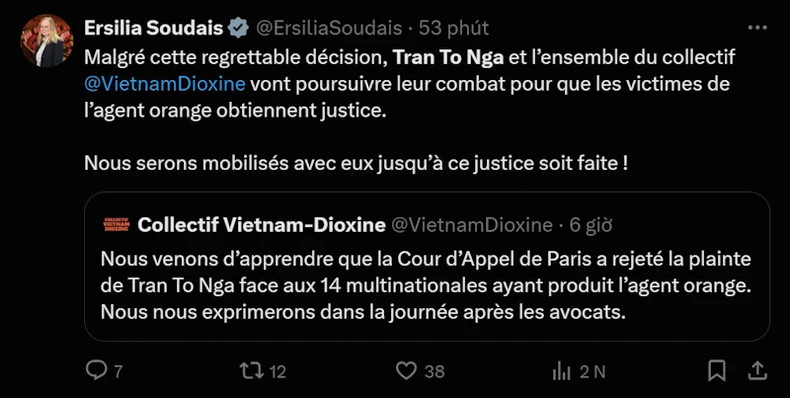 |
| Member of French Parliament Ersilia Soudais also strongly supported Tran To Nga on her social media X, stating that despite the unfortunate court decision, Tran To Nga and the Vietnam-Dioxin group will continue their fight for justice for the victims of Agent Orange. She also declared that she will stand by them until justice is served. |
Former President of the France-Vietnam Friendship Association and a member of Tran To Nga's support committee, Gérard Daviot, expressed his anger at the Paris Court of Appeal's decision. He found this ruling even more disappointing than the Evry Court's verdict, deeming it an unjust denial of justice.
According to the lawyers, the judges maintained a conservative stance contradicting the nature of the legal arguments presented, as well as international law. The decision ignored the horrific consequences of Agent Orange that Tran To Nga and more than three million other victims in Vietnam continue to endure, which they deemed unacceptable.
"I fully support Tran To Nga’s continuous fight and her appeal to a higher court," Daviot stated. He added that, as President of the France-Vietnam Friendship Association for many years, he has always supported Tran To Nga’s struggle. “We consider it one of our top priorities”, he said. Daviot praised Tran To Nga as a tireless advocate who, despite the challenges, remains committed to seeking justice for herself and other victims. He expressed confidence that she would not give up, describing her as an admirable woman who honours her homeland and empathises with the suffering of Agent Orange victims living in dire conditions.
"Tran To Nga serves as an inspiration to all those who share the determination to fight for justice for Agent Orange victims and to promote friendship and peace among nations”, Daviot concluded.
Like Tran To Nga, we must not give up, no matter the frustration we may feel at this moment. We must redouble our efforts to fight against injustice.
Gérard Daviot
On August 22, the French newspaper L’Humanité published three articles with the titles: “Tran To Nga: With this trial, the Agent Orange manufacturers show their weakness and fear of me”, “Agent Orange: Tran To Nga's fight against US chemical poison”, and “Agent Orange: Tran To Nga loses the case, but the fight will continue”.
L’Humanité pointed out the staggering toll of over 5 million people affected and millions of hectares of forests and mangroves destroyed. Agent Orange, a defoliant used by the US military during the Vietnam War, continues to have devastating environmental effects today. Despite the war ending 50 years ago, the legacy of Agent Orange persists, with children being born with severe deformities and victims suffering from numerous serious illnesses caused by the chemical.
The newspaper emphasised that the US government enjoys wartime immunity, and the chemical companies are hiding behind this shield to evade responsibility.
The paper also criticised these companies for compensating US veterans, acknowledging their responsibility for the chemicals used during the Vietnam War, yet denying justice to the Vietnamese victims. Dioxin was not the result of a “forced directive” from the US government but rather was proactively researched and produced to meet the requirements of the US military at that time.
Le Monde, another leading French newspaper, noted that in the US, some chemical companies compensated veterans without a court ruling, yet in 2005, the court dismissed the lawsuit of Vietnamese Agent Orange victims because Agent Orange was not considered a chemical weapon.
The article quoted Tran To Nga's lawyers, William Bourdon and Bertrand Repolt, who expressed that while Tran To Nga was deeply disappointed by the Paris Court of Appeal's decision, she understands this is a long and challenging battle.
Dow Chemical, Monsanto, Thomson Hayward, Hercules, Uniroyal, Diamond Shamrock, and Occidental Chemical Corporation, are a few of the 26 American chemical companies responsible for this crime. After mergers and rebranding, 14 multinational companies remain on the lawsuit list.
These companies have argued that they are protected by sovereign immunity because they acted “in the national interest and under the government’s orders” at that time.
However, Le Monde also highlighted that those advocating for the victims of Agent Orange have provided a comprehensive dossier on the harmful levels of the chemical products that these companies were aware of. Evidence shows that they conducted animal testing at the time, along with many meeting minutes and correspondence with other partners.
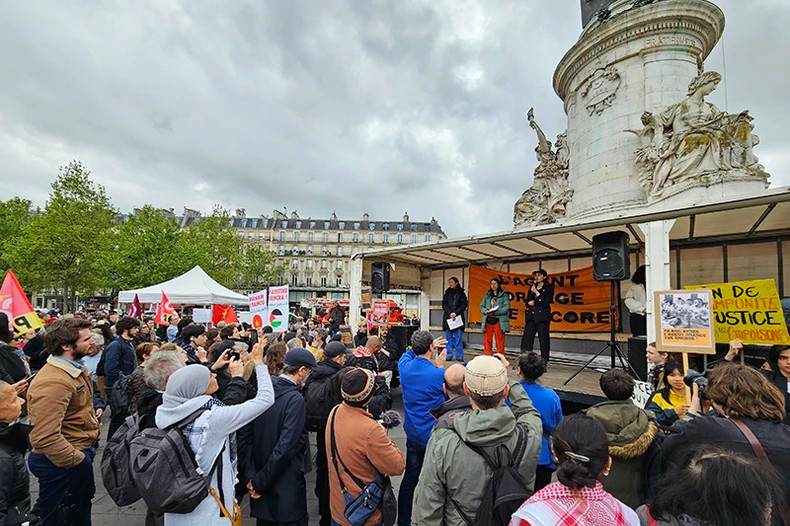 |
| A rally was held in Paris on May 4, 2024, to support the lawsuit by Tran To Nga and to share the pain with Vietnamese Agent Orange victims. (Photo: MINH DUY) |
The article published on the same day on the FranceTvInfo website cited Stellman's report, that like Tran To Nga, approximately 2.1 to 4.8 million people were exposed to Agent Orange, mostly Vietnamese, also including Laotians and Cambodians.
FranceTvInfo's website also added in 2010, the World Health Organisation (WHO) pointed out that “this contaminant can cause reproductive and developmental problems, damage the immune system, interfere with the endocrine system, and cause cancer”.
Notably, in 1984, 15,000 American veterans received 180 million USD in compensation for diseases such as cancer, liver disorders, and neurological disorders after returning from the battlefield in Vietnam, where they were exposed to Agent Orange.
France24's website reported that one of Tran To Nga’s daughters died of congenital heart defects at only 17 months old, while her other two daughters suffered from severe illnesses. Tran To Nga herself also suffers from recurrent tuberculosis, cancer, and diabetes.
France24 also quoted the Vietnam-Dioxin group, which has been supporting Tran To Nga since the early days, describing the Paris Court of Appeal's ruling as “a denial of justice for the victims of Agent Orange”.
In the US, the struggle against Agent Orange in the 1970s introduced the term “ecological genocide” to describe the deliberate destruction of the environment.
On the same day, Libération, another prominent French newspaper, also quoted lawyer William Bourdon’s statement that in this case, which is fundamentally a matter of principle, the judges exhibited a conservative attitude, contrary to the modernity of the law and inconsistent with international and European law. Therefore, this legal battle will continue at higher court levels.
The Paris Court of Appeal’s ruling rejecting Tran To Nga’s appeal has also been a topic of interest for many major and minor newspapers and online news sites in France. Numerous articles published on the websites of BFM Television, TV5 Monde, La Croix, Le Nouvel Obs, Reporterre, Nouvelles Du Jour, Ouest France, 7 sur 7, etc., shared common views supporting a challenging legal struggle for justice and the rights of Vietnamese Agent Orange victims.
